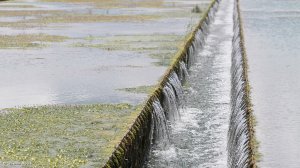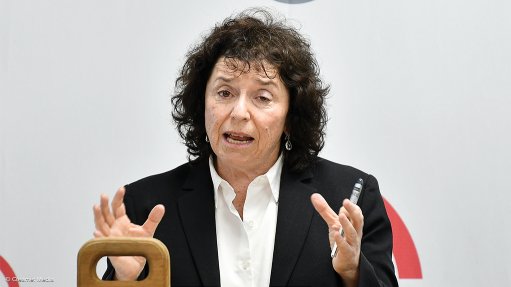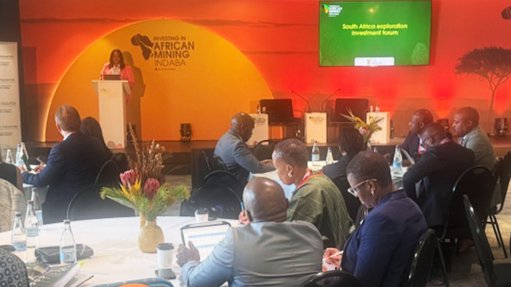Proactive national water programme on the cards

DBSA disruption specialist Johann Lübbe and infrastructure finance specialist Konstant Bruinette discuss the progress being made on a new national water programme that the DBSA is developing.
The Development Bank of Southern Africa (DBSA), in partnership with various government departments, is addressing the country’s water woes with the development of a proactive national water programme that aims to offer tangible solutions to municipalities, the relevant government departments and other role-players in the water sector.
“It is envisaged that the programme and its various sub-programmes, while still in various phases of development, will be functional by mid-2021,” explains DBSA disruption specialist Johann Lübbe.
The proactive water programme builds on two of the bank’s current goals, which include offering a centre of excellence for water-based projects, as well as blended funding options for financiers of new water-related projects in the country.
The national water programme will assess various solutions to water scarcity and include sub-programmes or focus areas including water reuse, non-revenue water, off-grid sanitation and rural water supply, as well as seawater desalinisation.
A further aim of the DBSA encompassed in the programme is to develop solutions to engage the private sector in both the funding of water projects as well as operation and maintenance support to municipalities and other water sector entities. One such solution is the new government-led private-sector participation model.
“The private-sector participation model is a joint development initiative between government and the private sector, which will promulgate the private sector’s investment in projects, as well as capitalise on its expertise to assist in supporting underresourced municipalities with the operation and maintenance of its water services infrastructure.”
The DBSA has received funding from the Green Climate Fund (GCF) for the water reuse sub-programme’s design aspects.
“We are in the procurement process where we will appoint an advisory team who will work with us to design the water reuse sub-programme.
“It is then DBSA’s intention is to go back to the GCF with an application for concessional funding, which the DBSA will allocate in a blended manner, with development finance institutions and private-sector investment, to water reuse projects being put into effect in South Africa.”
Lübbe adds that a centre of excellence is being conceptualised around the Renewable Energy Independent Power Producer Procurement Programme centre of excellence in the energy sector, but with its focus on water.
It is envisaged that the centre will be housed at the DBSA offices in Midrand, Gauteng, until a permanent location can be acquired.
“Once opened, it will serve as a centralised hub that can assist municipalities, relevant departments and water boards in creating bankable projects,” Lübbe enthuses.
DBSA infrastructure finance specialist Konstant Bruinette tells Engineering News that the national water programme will include a communication drive to better educate not only municipalities and government departments but also the public about water conservation, recycling and reuse. This will build on the work done by the Department of Water and Sanitation and the Water Research Commission in developing a communication strategy for water reuse.
“We will have not only a generic national campaign regarding water reuse or water conservation but also project-specific awareness campaigns where municipalities are planning to implement water reuse or conservation projects and will follow the required public participation processes.”
A good example is the City of Tshwane holistic water conservation programme, where the consumer awareness campaign strategy has been designed and costed as part of the programme roll-out.
The national water programme will further consider standardisation in terms of feasibility studies, contract documentation, loan application processes and cost-saving models to offer all role-players a degree of predictability around the processes, thereby reducing transaction costs and improving speed to the market.
Bruinette points out that a big focus of the proactive water programme is to develop blended finance solutions for municipalities that have limited resources and funding and will allow private-sector investment into water infrastructure.
However, he stresses that operation and maintenance are paramount when discussing such projects with the municipalities.
Operation and maintenance budgeting for best practice objectives is a key component of the programme and will form part of the ultimate funding solution for the projects.
“We are looking at the duration of the project life of about 20 to 30 years, and not just its inception in the short term,” notes Bruinette.
Lübbe adds that the water reuse sub-programme will aim to change the paradigm regarding the treatment of effluent and the potential it holds to mitigate water shortages in South Africa.
The treatment of effluent and the resultant reuse of the water, ability to generate energy and the beneficiation of sludge holds enormous potential to extract maximum value from what is often seen as a worthless and ‘waste’ resource, he says.
“We would like to move away from referring to our effluent treatment facilities as ‘wastewater treatment works’ and rather start referring to them as ‘water resource centres’,” he concludes.
Article Enquiry
Email Article
Save Article
Feedback
To advertise email advertising@creamermedia.co.za or click here
Comments
Press Office
Announcements
What's On
Subscribe to improve your user experience...
Option 1 (equivalent of R125 a month):
Receive a weekly copy of Creamer Media's Engineering News & Mining Weekly magazine
(print copy for those in South Africa and e-magazine for those outside of South Africa)
Receive daily email newsletters
Access to full search results
Access archive of magazine back copies
Access to Projects in Progress
Access to ONE Research Report of your choice in PDF format
Option 2 (equivalent of R375 a month):
All benefits from Option 1
PLUS
Access to Creamer Media's Research Channel Africa for ALL Research Reports, in PDF format, on various industrial and mining sectors
including Electricity; Water; Energy Transition; Hydrogen; Roads, Rail and Ports; Coal; Gold; Platinum; Battery Metals; etc.
Already a subscriber?
Forgotten your password?
Receive weekly copy of Creamer Media's Engineering News & Mining Weekly magazine (print copy for those in South Africa and e-magazine for those outside of South Africa)
➕
Recieve daily email newsletters
➕
Access to full search results
➕
Access archive of magazine back copies
➕
Access to Projects in Progress
➕
Access to ONE Research Report of your choice in PDF format
RESEARCH CHANNEL AFRICA
R4500 (equivalent of R375 a month)
SUBSCRIBEAll benefits from Option 1
➕
Access to Creamer Media's Research Channel Africa for ALL Research Reports on various industrial and mining sectors, in PDF format, including on:
Electricity
➕
Water
➕
Energy Transition
➕
Hydrogen
➕
Roads, Rail and Ports
➕
Coal
➕
Gold
➕
Platinum
➕
Battery Metals
➕
etc.
Receive all benefits from Option 1 or Option 2 delivered to numerous people at your company
➕
Multiple User names and Passwords for simultaneous log-ins
➕
Intranet integration access to all in your organisation



















